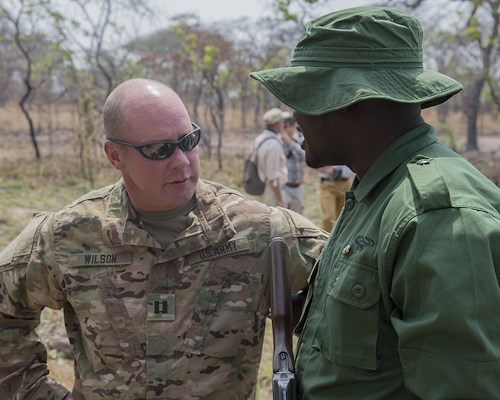

The African elephant is an animal that can be as tall as 14 feet, weigh more than 15,000 pounds, and typically has a life span between 60 to 70 years. While the creature already stands out as a formidable giant in the animal world, the African elephant also has two sharp tusks that can grow as long as 10 feet, which serve as additional insurance against any would-be predators.
It’s a sad irony then, that these tusks are also the reason the animal is becoming an endangered species.
Recent surveys by the Tanzania government have shown that the country’s elephant population has declined dramatically due to poachers hunting the mammals for their ivory tusks. What’s worse, the Center for Strategic and International Studies reports that ivory poached by violent extremist organizations is bartered for weapons and ammunition, compounding a conservation problem with an even larger security problem.
To combat the issue, Tanzania’s park and game reserve rangers have teamed with members of the U.S. Army’s 403rd Civil Affairs Battalion, a component of Combined Joint Task Force-Horn of Africa, and North Carolina National Guard, to conduct anti-poaching training from July to September 2016, at Rungwa Game Reserve, Tanzania.
“We are here for these two months to train Rungwa Park rangers in field craft to improve their ability to track, capture and arrest illegal poachers in the Rungwa game reserve,” said Capt. Michael Wilson, 403rd CA BN team leader. “Tanzania has the second highest concentration of African elephants on the continent. Their population has been halved in the past ten years. It’s a crisis that not only affects east Africa— it affects the whole world.”
The training involved teaching field techniques like first aid and movements to increase the rangers’ abilities to catch poachers.
“This is essentially based on increasing skills and knowledge of combat patrol in the field,” said Domina Mgelwa, a Rungwa Game Reserve game officer.
Mgelwa said that there have been a lot incidents of poaching, so learning from the U.S. Army soldiers has been beneficial to adapting to the criminals’ methods.
“We think [U.S. Soldiers] are more experienced in the field and they have more techniques which are important for us,” Mgelwa continued. “Time changes and techniques change, so we need some new knowledge and techniques.”
The Army soldiers taught several skills that are used on the battlefield to acclimate the rangers to the threats they may encounter in the wild.
“The goal for this training mission was to train 20 to 40 rangers in field craft,” Wilson said. “As an instructor in part of the counter illicit trade training team, I conducted medical training, intelligence training, a full [spectrum] of training activities.”
The rangers were also taught small unit tactics and Wilson described as enthusiastic about learning by Wilson.
“I found the Tanzanian rangers to be extremely friendly, open minded, hard working and willing to learn,” Wilson continued. “They came to class everyday ready to learn and— truth be told—we often took them outside of their comfort zone. They never complained, they did what we asked of them, and I think the benefit is that they will go away with skills and knowledge that will stay with them for their remaining time as rangers. “
Mgelwa also added that, while the training was difficult, the rangers pulled together and have built their confidence to protect the reserve.
“I can say that I am now able to fight with the poachers because I have gained the skills and the knowledge,” said Moses Munya, the game reserve’s senior game warden. “Also, I can train my colleagues who are not here at this moment, once I go back to my work station, and teach them some of the skills that I have acquired during this training.”
“I appreciate the Americans’ practice. They gave us the directives, and I also like the military tactics,” Moses continued. “They have trained us on how to crawl and different formations to reach the poachers’ camp, or even capture the poachers.”
The rangers aren’t the only ones that feel confident in their abilities to save the elephant population that has dwindled down to less than 44,000.
“I believe now that these rangers will be more effective in the bush in hunting poachers, and I believe the statistics will eventually bear out that our actions here have had a positive impact in the reduction of poaching in the Rungwa Game Reserve,” Wilson said.
“The opportunity is great,” Wilson continued. “It’s a noble endeavor to come here and be able to have a positive impact on such an important issue. Every kid on the planet knows what an elephant is, I hope that every kid on the planet can eventually come to a place like this and see a elephant living in the wild.”